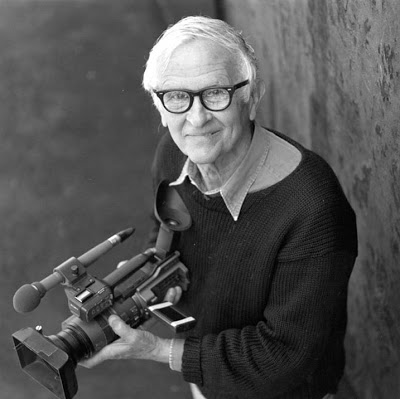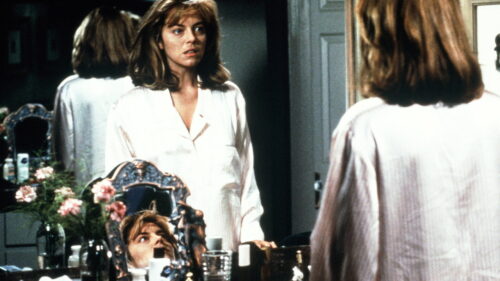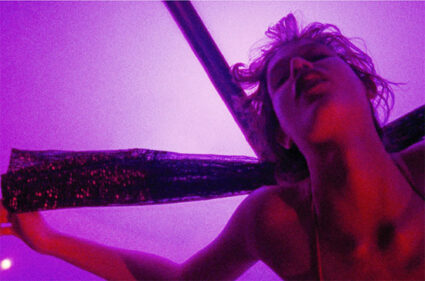Editor’s note: The following is a reprint of a 2002 Star-Ledger profile I did of the influential documentary filmmaker Albert Maysles, who died last week at 88. It is not available online. The preceding year, Maysles had won the cinematography prize at the Sundance Film Festival for shooting “LaLee’s Kin,” a film by Maysles, Deborah Dickson and Susan Froemke about the legacy of cotton farming in the American south. I’d spoken at some length to Maysles at an HBO party a couple of weeks earlier, in advance of the movie’s cable debut, and he invited me to visit the headquarters of Maysles Film, then located in midtown Manhattan. I spent a few hours there, and while this reported feature gives a sense of what it was like, I wish I’d saved the entire tape.—Matt Zoller Seitz
FOR ALBERT MAYSLES, life is an accident waiting to be
filmed. So, of course, he goes looking for accidents.
“Orson Welles once said to me, ‘What is film but a
series of divine accidents?'” recalls the skinny, bespectacled,
75-year-old filmmaker, interviewed last week in the memorabilia-strewn Midtown
Manhattan headquarters of Maysles Films. “The director’s role lies in
noticing what’s going on around him – things that other people see but don’t
catch on to.”
That’s not a bad way to describe Maysles’ way of making
movies.
In the ’60s and ’70s, the Maysles brothers helped pioneer
what is now called “Direct Cinema.” That means a nonfiction film that
has no narrator or host and is less interested in politics than people.
Maysles Films has released about three dozen documentary features
since its founding in 1957. The company’s short list of classics includes
“Meet Marlon Brando” (1965), a sketch of the method-acting icon
during a rocky career patch; “What’s Happening: The Beatles in the
U.S.A.,” about the British rockers’ first visit to the States;
“Salesman” (1969), a meticulous, haunting portrait of
door-to-door-salesmen; “Gimme Shelter” (1969), about the infamous
Rolling Stones concert in Altamont, Calif., and “Grey Gardens”
(1975), a portrait of two eccentric female cousins on the fringes of the
Kennedy clan.
To pay the bills, the company also makes corporate films and
commercials. It is a for-profit company that operates like a collective.
Some films assign director credit to Albert and David (who died of a stroke in
1987), others just to Albert, still others to the Maysles and one or two key
collaborators – an editor, a co-producer, anyone who made a profound
contribution. The company’s most recent effort, “Lalee’s Kin,” is
co-credited to Maysles and two longtime Maysles Films employees, filmmakers
Susan Froemke and Deborah Dickson.
Early on, the Maysles brothers divvied up the work and the
credit. Albert ran the camera, shooting his subjects with a zoom lens from
across the room; David did the sound, often with a shotgun microphone. They
worked this way to give their subjects enough space to be themselves. The
process generated mountains of footage, most of which was discarded during
editing, leaving hard, sharp, offhand details arranged with affection but
without judgment.
In essence, the company makes collages of life – a
comparison that is borne out by a visit to the office, whose walls are covered
with ragged, faded, strangely haunting photo collages by David Maysles.
Direct Cinema is not as well-known as another influential
mid-century film movement, the French New Wave, but it was arguably just as
important. The Direct Cinema filmmakers – whose ranks include D.A. Pennebaker
(“Don't Look Back“) and Frederick Wiseman (“High School“) –
revolutionized how movies were made.
These mostly young directors built new hand-held 16mm
cameras with synchronized sound and special attachments that let filmmakers
mount a battery on the back of the camera, allowing the crew to follow their
subjects anywhere. The filmmakers weren’t worried about getting pretty shots;
if a subject said something interesting in a room with dim lighting, they would
use the moment anyway. “In cinema, production value isn’t everything,”
says Maysles.
As if to prove he’s not kidding, he later leads a reporter
to a poster on the wall that collects 100 small portraits of American
cinematographers, part of a 2000 tribute by Kodak. Maysles locates his own
portrait among the 100 and asks, “Notice anything about this
picture?”
When no answer is forthcoming, he grins and says, “It’s
the only one on the poster with bad lighting.”

Extending the form
Maysles is being self-deprecating. In “LaLee’s Kin” – a searing look at the effects of cotton farming on generations of
African-Americans in Mississippi, co-directed by Froemke and Deborah Dickson –
there are lovely pictorial shots of cotton fields at dawn and dusk. Yet when
the story moves inside, talking to poor, often unemployed people in trailer
homes, Maysles records their cluttered lives and weathered faces with curiosity
and respect, returning some of the dignity their lives stole from them.
Last year Maysles, who photographed about 80 percent of the
film himself with a 16mm camera, was awarded the cinematography prize at the
Sundance Film Festival, the first time in the festival’s history that the award
was given to a documentary.
“In various ways, I’ve been trying to extend the
documentary form,” says Maysles. He compares Direct Cinema to a similar
movement that was happening in print, the Nonfiction Novel – an offshoot of the
so-called New Journalism, practiced by the likes of Tom Wolfe, Truman Capote
and Norman Mailer. In both mediums, the storyteller tried to notice as many
details as possible while appearing to fade into the woodwork.
Direct Cinema often captures uneventful moments, and it is
equally interested in unhappy and happy characters. The people in “LaLee’s
Kin” live lives of desperation, but they also enjoy themselves and their
friends and family, and the movie makes sure we see that.
Maysles and his brother pursued a similar strategy in
“Grey Gardens” (1975); the women gave the filmmakers such access to
their chaotic lives that the Maysles were accused of exploiting the mentally
ill. The only way to get around such criticism was by portraying the sisters as
miserable. The Maysles wouldn’t do it, because it didn’t feel true.
“I like to show people functioning in fairly normal ways,”
Maysles says. “It seems like you’re always having to look at families
killing one another. It’s like people are following Tolstoy’s misguided
statement that all happy families are alike in their own way, but every unhappy
family is different. That makes people conclude, ‘Well, why bother with the
happy ones?'”
Maysles Films is one of the happy families. The company has
had the same name for 45 years and the same office for 20. It has employed the
same key people since the 1970s; many had never made films until they got jobs
there.
Says Froemke, who started out at Maysles Films as a temp
secretary, “The Maysles never wanted to hire anybody who went to
film school. They wanted people who were interested in people, and in everyday
life.”
The list of people who once worked for the Maysles reads
like a Who’s Who of modern documentary cinema – Barbara Kopple (“The
Hamptons”), Bruce Sinofsky and Joe Berlinger (“Paradise Lost: The
Child Murders at Robin Hood Hills”) and longtime employee Dickson, who
just finished a portrait of novelist and social critic Gore Vidal for PBS’
“American Masters.” “Everybody we hire wants to be a filmmaker,”
Froemke says. “We like that. We like to nurture young, up-and-coming
filmmakers.”
Maysles is 45 years past being labeled an up-and-comer, but
there is still something impetuous, even adolescent, in his energy. When he
gives a guest a walking tour of the office’s many framed photos of the Maysles
on location, he makes sure to point out ex-girlfriends. Unlike many veteran directors,
he isn’t threatened by the digital revolution. He adores the portability and
convenience of video and swears he will never shoot on film again; his reasons
are summarized in a photocopied manifesto he hands out to visitors.
He works on two or three movies a year. He never knows where
the next idea is coming from. Sometimes he just hops on a plane and visits
another city or country, looking for a new character, a fresh narrative. For his next project, tentatively titled “Lifetime
Stories,” Maysles will ride trains in six countries, armed with a small
digital video camera, meeting people at random and talking with them. “In
each country, hopefully I’ll find one person with a story good enough that
it’ll make me want to get off the train with them.” [Ed: Maysles didn’t get around to making “Lifetime Stories,” but he did direct or co-direct seven more features after this conversation.]
“You have to rely on luck to be a documentary
filmmaker,” Froemke says. “I think Al’s a very lucky guy.”
She thinks for a moment, then says, “There’s a lot of
luck that happens when you’re working with Al.”












